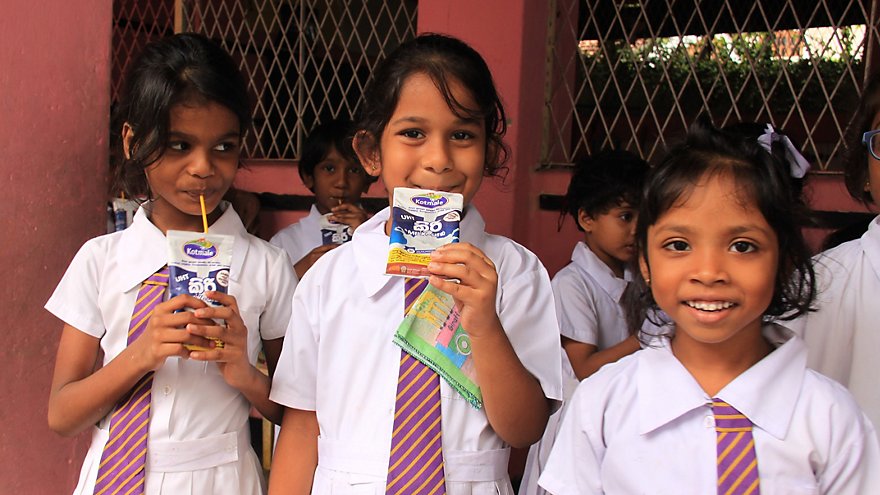Sri Lanka 2020
School milk programme launched to improve food security in Sri Lanka
According to the World Food Programme, Sri Lanka has levels of acute malnutrition – ranging between 14 and 35 per cent. According to Ministry of Agriculture in Sri Lanka, less than 40 per cent of the milk demand is produced locally, and the yields per cow are low. To address these challenges, the Government launched a school milk programme in 2019, with the objectives of providing locally sourced quality nutrition and boosting milk production. It is initially covering 400,000 children, and Tetra Pak is already supplying Tetra Fino® Aseptic 150ml packages for milk to 185,000 school children.
Malnutrition is considered to be an obstacle for socio-economic development in Sri Lanka, which has a growing population of 21 million. However, malnutrition can be combatted by increasing the local milk production, with low yields per cow being at less than 2 litres per day.
100 per cent locally produced UHT milk
To cope with these challenges, the Government of Sri Lanka launched a school milk programme initially covering 400,000 children from 950 schools and is using 100 per cent locally produced UHT milk. It is fully funded by the Government and implemented by the Ministry of Education.
“Our customer Cargills Ceylon started supplying milk in Tetra Fino® Aseptic 150ml packages to 185,000 school children in 400 schools,” says Ashutosh Manohar, Managing Director Tetra Pak South Asia Markets.
 '
'
Technical assistance ensures good support
Tetra Pak South Asia and the Tetra Laval Food for Development team supported Cargills Ceylon and the Ministry of Education by providing technical assistance and sharing best practices used in school feeding programmes around the world.
As part of the technical assistance support, essential training was provided to the customer and the Ministry of Education’s implementation team on proper food safety protocols, environmental education and recycling. Tetra Pak has also identified and engaged a local partner to collect and recycle the used carton packages from schools.
400 schools participating in environmental education workshops
“This is a unique programme that balances two important priorities of Tetra Pak – food safety & access and sustainability. Children from the 400 participating schools now have access to quality nutrition and are also learning about their environmental responsibility, making sure that used carton packages are recycled,” said Ashutosh Manohar.
The school milk programme has the common objective of providing locally sourced quality nutrition and boosting milk production. The Ministry of Education is measuring nutritional indicators among children such as height, weight and how the improved attendance can eventually benefit learning.
“As a long-term objective, we look forward to continuing to provide technical assistance and training to the farmers working through our Dairy Hub model to improve the milk production,” concludes Rafael Fabrega, Director Tetra Laval Food for Development.